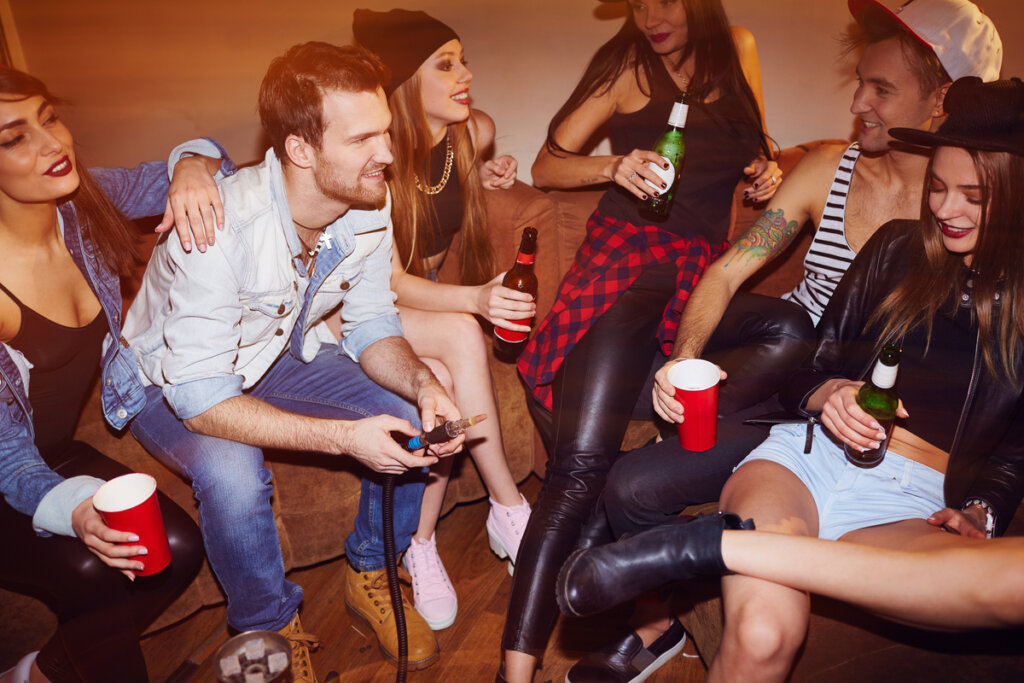Drunkorexia: Substituting Alcohol for Food


Written and verified by the psychologist Valeria Sabater
Drunkorexia is an alteration of eating behavior. It occurs most frequently in young university students and manifests itself mainly at the weekend. During that time, and given that their objective is to consume alcohol during their leisure hours, students decide to restrict their food intake. In that way, they have more control over the number of calories they consume.
We’re facing borderline behavior here that’s both disconcerting and worrying at the same time because it’s on the rise. In fact, what began as a practice among university students is now also spreading among the 25 – 35-year-olds.
It was just over a decade ago that the New York Times first described and named this practice. Nevertheless, drunkorexia isn’t currently classified as a clinical category or disorder in any diagnostic manuals. However, it’s clear that it’s a kind of eating disorder (ED). Indeed, experts warn of the need to pay attention to this increasingly frequent phenomenon.
Restricting food intake is also intended to make the effects of binge drinking appear more quickly.

Definition, characteristics, and causes of drunkorexia
Drunkorexia is an alteration of eating behavior. The person who suffers from it replaces calories from food with calories from alcohol. It isn’t a clear form of alcohol addiction, nor is it an ordinary eating disorder such as bulimia or anorexia. In fact, it’s another phenomenon entirely that requires attention, analysis, and prevention measures.
In 2020, the University of Huddersfield (UK) conducted research in an attempt to understand this practice. The researchers wondered if, in fact, it’s an exclusive custom of university students and what could be its motivators.
They discovered that, in reality, drunkorexia is a growing trend that goes beyond the student community. Low self-esteem and sensation-seeking seem to be two of its triggers. There are also more variables that we should know about.
How does it manifest?
The main characteristic of this practice is to restrict food during the weekend, with the idea of replacing calories from food with those from alcohol. In other words, the objective of drunkorexia is weight control. Another motivation is to enjoy the alcoholic beverages themselves and the social context surrounding their consumption.
- As well as dieting with the aim of compensating for the calories consumed from alcohol, there’s another purpose. That’s to get drunk faster.
- Intense exercise is carried out to burn these calories before the weekend.
- It frequently leads to purging behavior. Therefore, individuals make themselves vomit or resort to the use of laxatives or diuretics.
Binge drinking combined with eating disorders is more common in women.
The effects of drunkorexia
Drunkorexia has a serious impact on an individual’s health. More particularly, if the practice extends over time and becomes a habit. This is because:
- The calories obtained from alcohol are empty calories with hardly any real nutritional value. This results in dehydration and a great deficit of vitamins and minerals.
- The risk of developing into alcohol dependence is increased.
- Eating disorders such as bulimia, anorexia, binge eating disorder, etc. are also likely to develop.
- In the long term, liver diseases, cardiovascular problems, diabetes, dementia, osteoporosis, menstrual disorders, accelerated aging, etc. may appear.
The culture of thinness
For decades, we’ve lived in a culture in which the tyranny of the perfect body and thinness as the only form of beauty reigns. Social media is a mirror in which young people look at themselves daily to compare and also judge themselves. This leads to practices that are increasingly harmful as well as sophisticated.
- As a rule, low self-esteem and social imitation are the core elements that trigger drunkorexia. On the one hand, individuals feel the need to control their own weight. On the other, they have the desire to integrate into their social group. In fact, drinking and getting drunk is how many young people spend their weekends.
- Poor emotional coping skills are another factor. These young people don’t have the resources to manage anxiety and deactivate socially imposed canons of beauty from their mental narratives.
- Academic pressure, work, and family problems, and general disenchantment with society are other motivators for turning to alcohol as an escape mechanism.

Treatment for drunkorexia
In 2018, the University of Southern California published an article on drunkorexia. It proposed including a new diagnostic category, that of food and alcohol disturbance (FAD). It’s clear that we’re facing a really serious problem here, in which two clinical spheres are combined: alcohol consumption and an eating disorder.
In cases of drunkorexia, the sufferer should visit a doctor to be referred to specialized centers. Multidisciplinary care is required to attend to the disorder from the psychological, nutritional, and medical levels. However, those who suffer from this problem don’t usually seek help until they’re highly malnourished and addicted to alcohol.
Each patient requires an individualized treatment plan. These programs are made up of doctors, psychologists, nutritionists, and other therapists who provide the necessary support. Consequently, they’re able to rebuild their own lives and adopt new and improved daily habits.
Expert help should always be sought in these cases.
All cited sources were thoroughly reviewed by our team to ensure their quality, reliability, currency, and validity. The bibliography of this article was considered reliable and of academic or scientific accuracy.
- Griffin, B.L., Vogt, K.S. Drunkorexia: is it really “just” a university lifestyle choice?. Eat Weight Disord 26, 2021–2031 (2021). https://doi.org/10.1007/s40519-020-01051-x
- Pietrabissa , G., Rossi , A., Gaudenzi , M., Bertuzzi , V., Tagliagambe , A., Volpi , C., Manzoni , G. M., Cattivelli , R., Mannarini , S., Castelnuovo , G., & Simpson , S. (2021). Drunkorexia: empirical investigation and analysis of the characteristics of the phenomenon in an Italian sample of adolescents and young adults. Psychology, Society & Education, 10(3), 285-299. https://doi.org/10.21071/psye.v10i3.13920
- Laghi F, Pompili S, Bianchi D, Lonigro A, Baiocco R. Psychological characteristics and eating attitudes in adolescents with drunkorexia behavior: an exploratory study. Eat Weight Disord. 2020 Jun;25(3):709-718. doi: 10.1007/s40519-019-00675-y. Epub 2019 Mar 19. PMID: 30888609.
- Malaeb, D., Bianchi, D., Pompili, S., Berro, J., Laghi, F., Azzi, V., Akel, M., Obeid, S., & Hallit, S. (2022). Drunkorexia behaviors and motives, eating attitudes and mental health in Lebanese alcohol drinkers: a path analysis model. Eating and weight disorders : EWD, 27(5), 1787–1797. https://doi.org/10.1007/s40519-021-01321-2
This text is provided for informational purposes only and does not replace consultation with a professional. If in doubt, consult your specialist.








